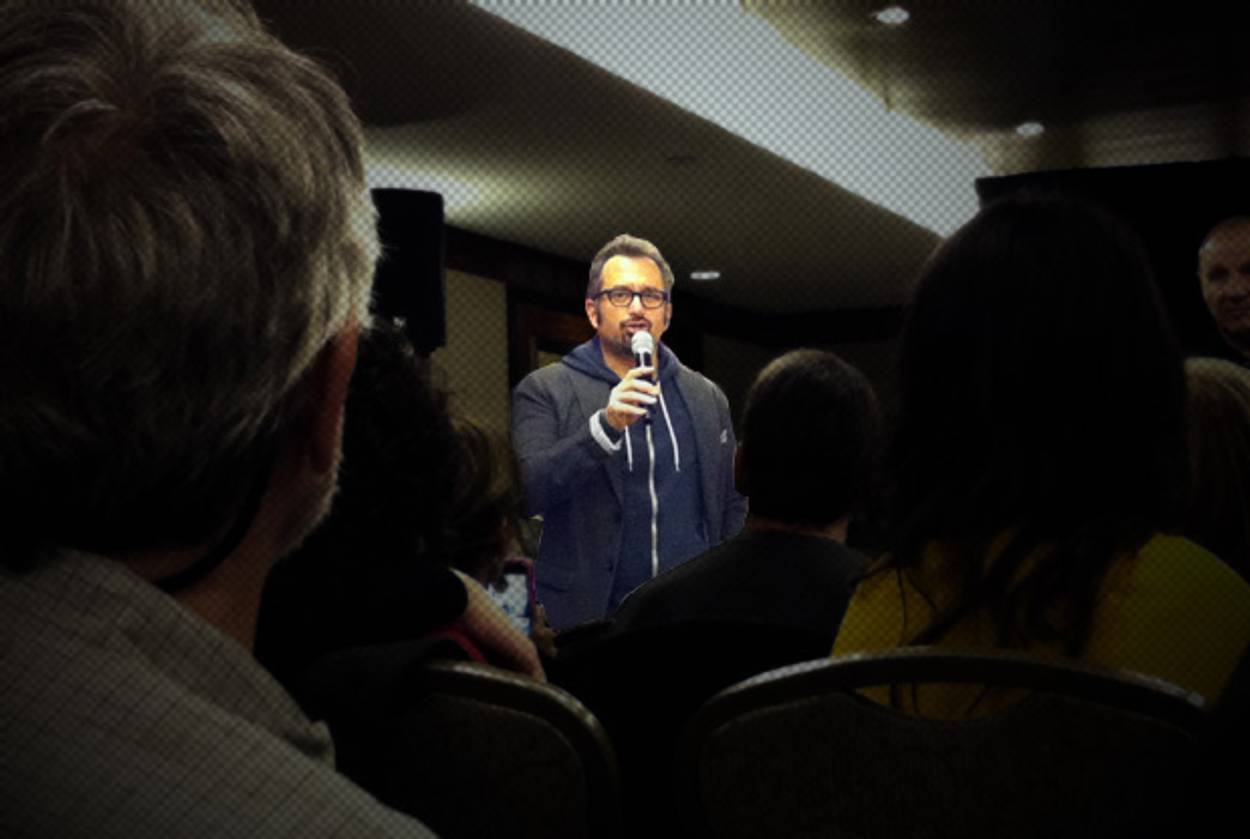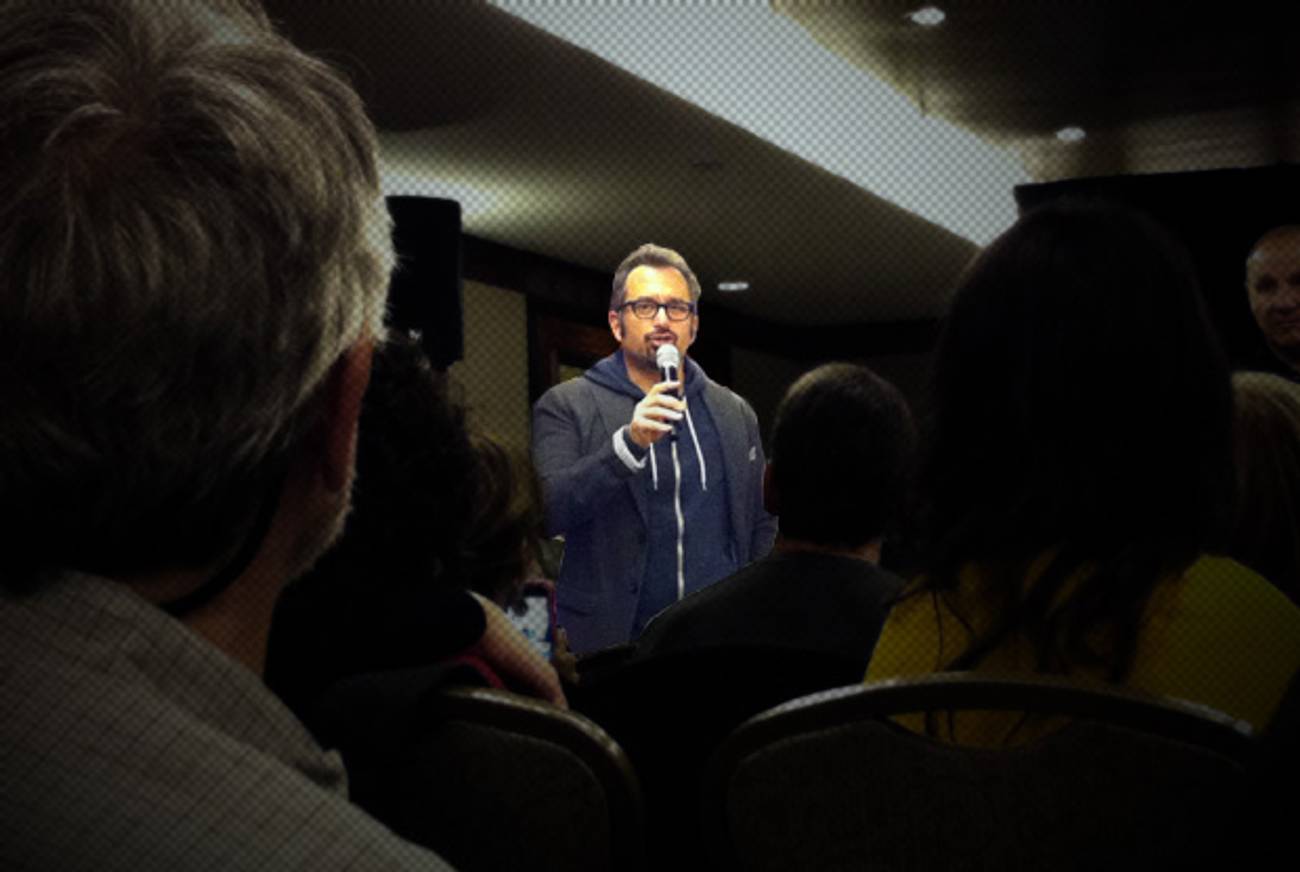Exonerating the Friedmans
Filmmaker Andrew Jarecki is trying to overturn Jesse Friedman’s 1989 Great Neck molestation conviction




Sometimes, after the credits roll, another—more important—story begins.
In 2003, Andrew Jarecki and Marc Smerling released Capturing the Friedmans, the story of an average middle-class Jewish family destroyed by sex abuse charges against their then 18-year-old son, Jesse, and his father, Arnold. The film was nominated for an Academy Award, won the Grand Jury Prize at Sundance, and graced the tops of countless lists of best documentaries of all time. Amid all the praise, though, was a nagging sense—lobbed by some—that the filmmakers were ultimately too ambiguous about their main subject’s innocence or guilt.
As it turns out, Jarecki and Smerling have had strong and very clear feelings about Jesse Friedman’s innocence. The two have spent the years since the documentary’s release traveling the world at their own expense to interview some of the 14 former students whose testimony contributed to Jesse Friedman’s conviction. That collection of video testimony was released to the public on Sunday in Great Neck, N.Y., the Long Island town clearly struggling to come to terms with its role in the sordid tale.
“I happen to believe that Jesse Friedman is innocent,” Jarecki said before playing the video testimony. “But our interest in the case and the reason we spent so much time on it goes far beyond Jesse. I think everybody in the Great Neck community was damaged in some way by this case.”
A few days shy of the 25th anniversary of his arrest, Jesse Friedman returned to the town to attend the screening of the new testimony in the case that resulted in him spending 13 years behind bars. Visiting Great Neck, he said, was like “having a picnic in Auschwitz”—a place with nothing but memories of his childhood destroyed and family torn apart.
“Hysteria was created in Great Neck,” one of his high-school friends explains in the testimony. “Great Neck itself became one hysterical Jewish grandmother.”
***
Before the presentation began, people slowly filled the hotel banquet hall, talking in hushed voices about their connection to and opinion on Jesse’s case. “There was no physical evidence in the case,” one older lady bent her head close to her friend’s and whispered incredulously. Peter Panaro, Jesse’s lawyer at the time of his conviction, leaned over me to speak with the man in the chair behind me. “The sad part about this is he’s really not guilty,” Panaro told the man, who turned out to be the former legal secretary for the judge who presided over Jesse’s case.
If Jarecki and Smerling have anything to do with it, Capturing the Friedmans will follow the legacy of documentaries like Paradise Lost, which helped lead to the eventual release of three men wrongfully convicted in a 1993 murder case. Jarecki and Smerling’s film—which Friedman himself describes as “the greatest thing that could ever happen”—rolled out the prosecution’s claims against Jesse and Arnold and then slowly threw each one into doubt. The charges against them are described at one point as someone’s “sick fantasy.” They included tales of nightmarish sex scenes involving Jesse and Arnold sodomizing multiple children at once, among other charges. As the movie asserts, the case contained no physical evidence and was instead based solely on witness testimony of young children obtained using questionable methods such as hypnosis and memory recovery.
Nevertheless, faced with spending 60 years behind bars, Friedman accepted a deal to plead guilty in exchange for a sentence of 18 years maximum. But in the years following the plea, he has maintained his innocence. He was released from jail after 13 years and in 2004 filed to have his conviction overturned, while he was still on parole. His case currently hangs in limbo, awaiting the outcome of a re-investigation recommended in a 2010 ruling by New York’s Second Circuit Court of Appeals, which wrote that there was a “reasonable likelihood that Jesse Friedman was wrongly convicted.”
One of those affected by the case was Arline Epstein, the mother of a child who had attended group therapy along with children who had testified against Jesse. Earlier this year, Arline’s son Michael told her that, as a young boy, he had lied to his therapist about being sexually abused. In her testimony, which was featured at Sunday’s event, Arline talks about revisiting a file of notes she had kept during the case and finding one that mentioned that during the first round of questioning of the children by police, none of them said they had been abused.
Arline and Michael Epstein are two of the witnesses featured in the video reel of new testimony compiled by Jarecki and Smerling, and both were at Sunday’s event. Friedman was overwhelmed by the warm welcome he received from someone, who, as he put it, “for 25 years thought that I’d raped her son.”
The compilation of new evidence, which is being made available to view online, featured interviews that Jarecki and his team conducted with children involved in the case, all of whom are now adults. In addition to Michael Epstein, several other former students say in the movie that they were, contrary to their testimony, never molested. A few of the adults interviewed admit that they lied to the police and detectives as children in order to stop the endless questioning that they had to endure. The audience reacted with gasps and sighs at the footage of Judge Abbey Boklan, who told the filmmakers while sitting in her office that she believed Jesse was guilty without needing to see any evidence and that she knew he smoked pot and did LSD.
“Is she crazy?” the man next to me uttered under his breath.
When the testimony was over, people in the audience were eager to show their support for Jesse—a marked change from 1988, when he had been completely ostracized from the community by the charges.
“I knew Jesse when he was a little boy,” an older woman in the front row said. “Jesse was top of the heap. Wonderful wonderful wonderful. I would love to have a son like you any day of the week.” Another woman stood to face Jesse, mic in hand. “This room is filled with people supporting you, Jesse. This room is filled with people who remember. I just want to publicly say I am so sorry for what happened to you.”
Friedman was clearly moved by the support. His wife grasped his shoulder, at times tearing up. He then turned in his chair to listen to his close friend from high school, Judd Maltin, as Maltin took the mic. “I am just filled with rage about all of this,” Judd said. “Rage that the cops could do such a thing and build their careers on such heinousness and that we as a community were not brave enough to look at facts.”
Peter Panaro stepped in with an attempt to slam the point home. “Can you imagine going through what he went through? Just think of it. Being totally innocent, being put in front of TV cameras all over the country, the public humiliation, your father being arrested, going to jail, spending the next 20 years trying to clear your name, your father having died in prison because of this. And he doesn’t have an ounce of anger in him. I have to salute you because I could never be the man you are.”
As it turns out, Panaro is wrong. Friedman does get angry. He has spent the greater part of his 43 years telling his story to anyone who would listen, and he is visibly exhausted. Even though he completed his parole, his status as a level 3 sex offender remains, affecting every detail of his life, from where he is allowed to live to whether he and his wife should have children.
“This is so not over,” Jarecki told the audience as the event wrapped up. He encouraged everyone to sign a petition asking the district attorney to “correct the errors of the past” by overturning Jesse’s conviction. Email addresses were also collected so that Jarecki’s team could send out a link of the new video testimony that he is making available online. “This is never going to end until it’s over,” Friedman said. “And it’s not over until my conviction is vacated and I get an apology from the district attorney’s office.”
As the audience lingered after the event, Friedman’s brother David approached Arline Epstein. “You are like Superman,” he said to her as they embraced and he commended her for her bravery in giving testimony. Jesse Friedman walked off to the side of the room, led by his security detail—no longer a prisoner but still far from free.
***
Like this article? Sign up for our Daily Digest to get Tablet Magazine’s new content in your inbox each morning.
Tracy Levy is a freelance writer, producer, and multimedia journalist living in New York City. Her Twitter feed is @TrayLev.
Tracy Levy is a freelance writer, producer, and multimedia journalist living in New York City. Her Twitter feed is @TrayLev.